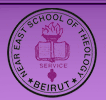NEST Newsletter – June 2019
 Charge to the Graduates
Charge to the Graduates
by Dr. George Sabra, President
Near East School of Theology
There is a report, conducted and published annually by the Wharton School of the University of and a well-known global consumer insight firm that ranks countries. Thousands of people over 80 countries are asked to respond to questions on the basis of 65 country attributes, e.g., influence, power, citizenship and quality of life, in order to determine each country’s success as nation. The rankings are part of an analysis project called the “Best Countries Report.” In 2018, and for the second year in a row, Switzerland ranked as the world’s best country, followed Sweden, Germany, United Kingdom, Japan, Sweden, Australia, United States, France, Netherlands.
Nowhere on the list can any country from the Middle East be found; actually, there is no ranking There is also such a thing as a research analysis report on the best country to raise children in: ranks first here, then Sweden, Norway, Finland, Canada… Again, no Middle Eastern country is anywhere sight.
If you check the report about the Safest Countries in the world – there is such a report that lists 31 – you will find that Iceland ranks first, and Latvia and Spain rank 31 and 30, but no Middle Eastern is anywhere in between or even in sight.
Dear graduates, you all come from the Middle East, from Syria, born and raised, but also from where you have lived and studied. Well, neither Syria nor Lebanon figure anywhere among the of the world, nor among the best to raise your children in, nor among the safest countries is very likely that they rank somewhere at the very end of such listings. Yet, it is in these countries, very end of every list, that you live, have studied theology, and where you will continue to live A different type of report, the Holy Scriptures, tells us that it is precisely in this region of the world all from the best country to be, that God chose to reveal Himself; it is in this region of the world formed a people and chose to accompany them; it is this region of the world that God chose for be born and to be raised in, in order to fulfill God’s mission to the whole world.
You have been trained in what is not the best countries in the world; you have been spiritually formed and theologically shaped in what is not the best countries to be raised in; and you will be serving in very unsafe but your theological training and spiritual formation are the best and most excellent, not because grades you got, or the seminary that you studied in, or the degrees you have acquired, but in so far as serve and dedicate your lives to precisely the countries that are not the best in the world, not the children-raising friendly, and not the safest.
For our part, as a theological seminary, we measure our success in theological education, not simply by our standards and qualified teaching staff, or the number of volumes we have in our library, or the use technology in learning tools, but most importantly by whether those who study here remain to persevere in what are not the best places to be, and so identify with, support, console, encourage, minister to their brothers and sisters in those places which the world reports scorn and ranks last, figured first on God’s list.
So, congratulations, dear graduates, not just because you received your degrees and finished your studies successfully, but because you will also put your education to use, and you will minister and serve, where it needed in this world-forsaken, but not God-forsaken, region. May that great declaration of faithfulness steadfastness of the prophet Habakuk be your guiding light and your graduation motto:
“Though the fig tree does not blossom, and no fruit is on the vines,
though the produce of the olive fails and the fields yield no food,
though the flock is cut off from the fold and there be no herd in the stalls,
yet I will rejoice in the LORD, I will exult in the God of my salvation.
GOD, the Lord, is my strength; he makes my feet like the feet of a deer,
and makes me tread upon the heights.” (Hab 3:17-19)
